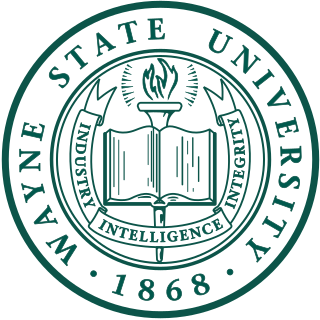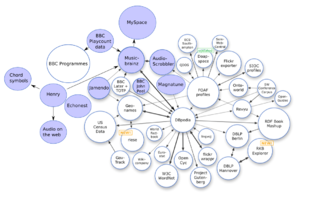The information explosion is the rapid increase in the amount of published information or data and the effects of this abundance. As the amount of available data grows, the problem of managing the information becomes more difficult, which can lead to information overload. The Online Oxford English Dictionary indicates use of the phrase in a March 1964 New Statesman article. The New York Times first used the phrase in its editorial content in an article by Walter Sullivan on June 7, 1964, in which he described the phrase as "much discussed". (p11.) The earliest known use of the phrase was in a speech about television by NBC president Pat Weaver at the Institute of Practitioners of Advertising in London on September 27, 1955. The speech was rebroadcast on radio station WSUI in Iowa City and excerpted in the Daily Iowan newspaper two months later.

JSTOR is a digital library of academic journals, books, and primary sources founded in 1994. Originally containing digitized back issues of academic journals, it now encompasses books and other primary sources as well as current issues of journals in the humanities and social sciences. It provides full-text searches of almost 2,000 journals. Most access is by subscription but some of the site is public domain, and open access content is available free of charge.

Wayne State University (WSU) is a public research university in Detroit, Michigan, United States. Founded in 1868, Wayne State consists of 13 schools and colleges offering approximately 375 programs. It is Michigan's third-largest university with nearly 24,000 graduate and undergraduate students. Wayne State University, along with the University of Michigan and Michigan State University, compose the University Research Corridor of Michigan. Wayne State is classified among "R1: Doctoral Universities – Very high research activity".

Biological databases are libraries of biological sciences, collected from scientific experiments, published literature, high-throughput experiment technology, and computational analysis. They contain information from research areas including genomics, proteomics, metabolomics, microarray gene expression, and phylogenetics. Information contained in biological databases includes gene function, structure, localization, clinical effects of mutations as well as similarities of biological sequences and structures.
The Correlates of War project is an academic study of the history of warfare. It was started in 1963 at the University of Michigan by political scientist J. David Singer. Concerned with collecting data about the history of wars and conflict among states, the project has driven forward quantitative research into the causes of warfare. The Correlates of War project seeks to facilitate the collection, dissemination, and use of accurate and reliable quantitative data in international relations. Key principles of the project include a commitment to standard scientific principles of replication, data reliability, documentation, review, and the transparency of data collection procedures.
The United States National Agricultural Library (NAL) is one of the world's largest agricultural research libraries, and serves as a national library of the United States and as the library of the United States Department of Agriculture. Located in Beltsville, Maryland, it is one of five national libraries of the United States. It is also the coordinator for the Agriculture Network Information Center (AgNIC), a national network of state land-grant institutions and coordinator for the U.S. Department of Agriculture (USDA) field libraries.
The National Institute on Aging (NIA) is a division of the U.S. National Institutes of Health (NIH), located in Bethesda, Maryland. The NIA itself is headquartered in Baltimore, Maryland.

Open data are data that are openly accessible, exploitable, editable and shareable by anyone for any purpose. Open data are generally licensed under an open license.

An online newspaper is the online version of a newspaper, either as a stand-alone publication or as the online version of a printed periodical.
The Health and Retirement Study (HRS) is a longitudinal survey of a representative sample of Americans over age 50 conducted by the Survey Research Center (SRC) at the Institute for Social Research (ISR) at the University of Michigan in Ann Arbor and supported by the National Institute on Aging (NIA). The study interviews approximately 20,000 respondents every two years on subjects like health care, housing, assets, pensions, employment and disability. The study is managed through a cooperative agreement between the NIA, which provides primary funding, and the ISR, which administers and conducts the survey. Beginning in 2012, HRS began adding genetic information from consenting participants to its database. The economic measures captured by the data in the HRS are regarded as being of very high quality.
Research data archiving is the long-term storage of scholarly research data, including the natural sciences, social sciences, and life sciences. The various academic journals have differing policies regarding how much of their data and methods researchers are required to store in a public archive, and what is actually archived varies widely between different disciplines. Similarly, the major grant-giving institutions have varying attitudes towards public archiving of data. In general, the tradition of science has been for publications to contain sufficient information to allow fellow researchers to replicate and therefore test the research. In recent years this approach has become increasingly strained as research in some areas depends on large datasets which cannot easily be replicated independently.
Data curation is the organization and integration of data collected from various sources. It involves annotation, publication and presentation of the data so that the value of the data is maintained over time, and the data remains available for reuse and preservation. Data curation includes "all the processes needed for principled and controlled data creation, maintenance, and management, together with the capacity to add value to data". In science, data curation may indicate the process of extraction of important information from scientific texts, such as research articles by experts, to be converted into an electronic format, such as an entry of a biological database.
Crown Copyright has been a long-standing copyright protection applied to official works, and at times artistic works, produced under royal or official supervision. In 2006, The Guardian newspaper's Technology section began a "Free Our Data" campaign, calling for data gathered by authorities at public expense to be made freely available for reuse by individuals. In 2010 with the creation of the Open Government Licence and the Data.gov.uk site it appeared that the campaign had been mostly successful, and since 2013 the UK has been consistently named one of the leaders in the open data space.

Museum informatics is an interdisciplinary field of study that refers to the theory and application of informatics by museums. It represents a convergence of culture, digital technology, and information science. In the context of the digital age facilitating growing commonalities across museums, libraries and archives, its place in academe has grown substantially and also has connections with digital humanities.

The University of Michigan Institute for Social Research (ISR) is the largest academic social research and survey organization in the world, established in 1949. ISR includes more than 300 scientists from a variety of academic disciplines – including political science, psychology, sociology, economics, demography, history, anthropology, and statistics. The institute is a unit that houses five separate but interdependent centers which conduct research and maintain data archives. In 2021, Kathleen Cagney became the first woman in its history to be named Director of the institute.
The National Addiction and HIV Data Archive Program (NAHDAP) is a repository of drug abuse and HIV/AIDS research data primarily including social science and behavioral data. NAHDAP’s mission is to bring the power of science to bear on drug abuse and addiction by supporting research across a wide range of disciplines and ensuring the rapid and effective dissemination and use of the results of that research to improve prevention, treatment and policy.
Myron Kent Jennings is an American political scientist best known for his path-breaking work on the patterns and development of political preferences and behaviors among young Americans. He is widely held in libraries worldwide and is recognized as one of the "founding fathers" of political socialization research and theory. He is Distinguished Professor of Political Science at the University of California, Santa Barbara and Professor Emeritus of Political Science at the University of Michigan. He was elected to the American Academy of Arts and Sciences in 1982, and served as the president of the International Society of Political Psychology in 1989–1990 and as the president of the American Political Science Association in 1997–1998.

The Inter-university Consortium for Political and Social Research (ICPSR) is an American political science and social science research consortium, based at the University of Michigan. It was founded in 1962. An integral part of the infrastructure of social science research, ICPSR maintains and provides access to a vast archive of social science data for research and instruction.
Karen L. Fingerman is the Wilson Regents Professor in Human Ecology and professor in the Department of Human Development and Family Sciences at the University of Texas at Austin. She has published nearly 200 works on intergenerational and social ties. Fingerman is well known for her work on older adult socio-emotional processes, health, and well-being. Most notably, Fingerman generated the Social Input Model and coined the term “consequential strangers”. In 2018, Fingerman founded the Texas Aging & Longevity Consortium and serves as the current Director in tandem with her position as Director of Research at the Texas Center on Aging and Population Sciences.







